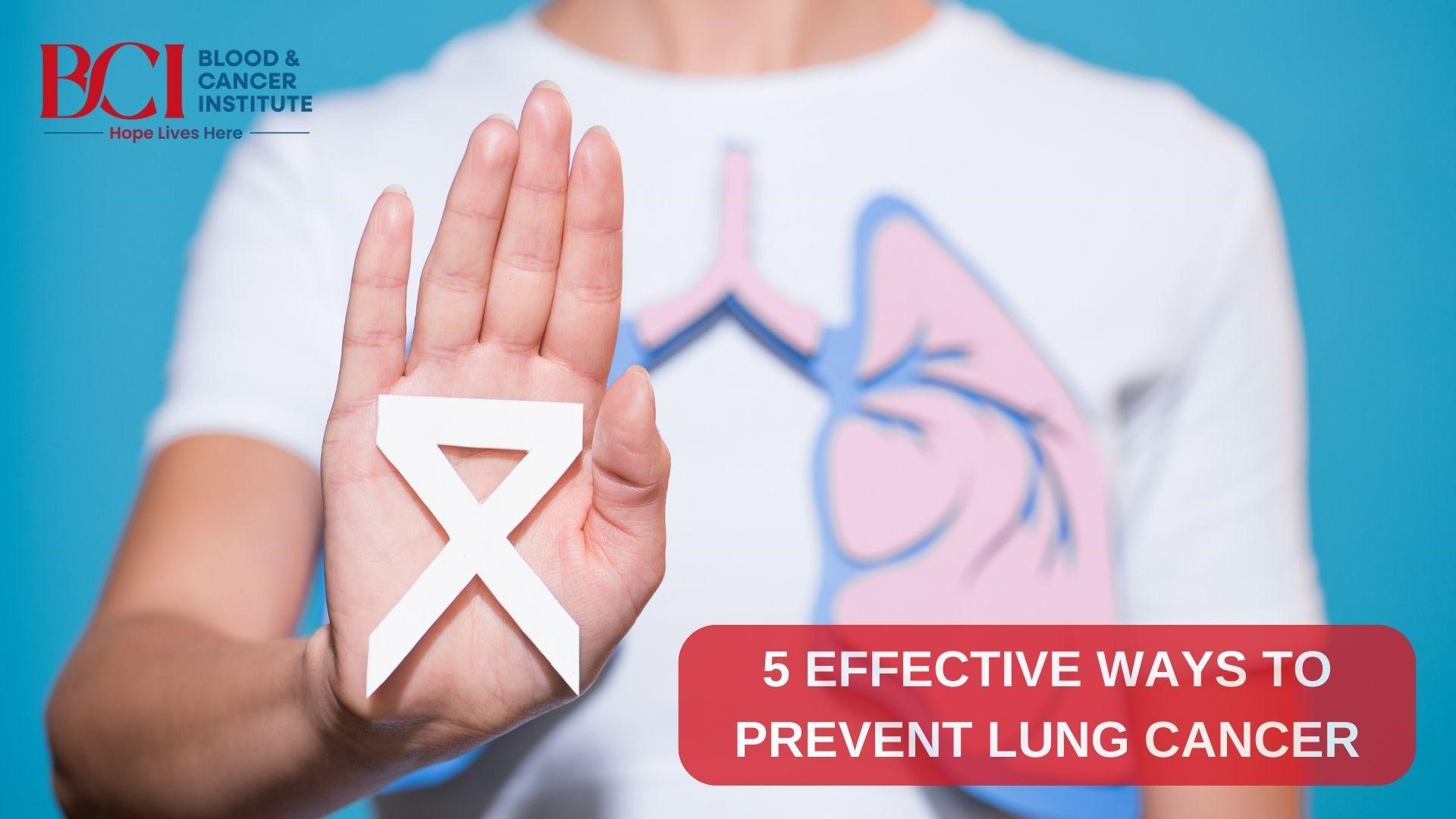
- By : BCI
- Blog
- Comments: 0
5 Effective Ways As Suggested By The Lung Cancer Specialist In Surat To Prevent Lung Cancer
Lung cancer remains one of the most deadly forms of cancer worldwide, claiming millions of lives each year. So is there any good news? Yes, many cases of lung cancer are preventable. By making smart lifestyle choices and avoiding key risk factors, you can significantly reduce your chances of developing this devastating disease. Our cancer specialists in Surat, at BCI- Blood and Cancer Institute, shed light on how to prevent lung cancer. In this blog, we've compiled these powerful strategies to protect your lungs and keep them healthy for years to come.
1. Quit Smoking - or Better Yet, Never Start
Smoking causes lung cancer. Period. Tobacco smoke contains over 7,000 chemicals, including at least 70 known carcinogens that damage lung cells and lead to cancer. If you currently smoke, quitting is the single most important step you can take to prevent lung cancer.
Quitting isn't easy, but it's worth it. According to the specialists at BCI- one of the best cancer hospital in Surat, your body begins to heal almost immediately after your last cigarette. Within just 20 minutes, your heart rate drops. Within 12 hours, carbon monoxide levels in your blood return to normal. Over the following weeks and months, your circulation improves, lung function increases, and your risk of heart disease begins to drop.
If you don't smoke, don't start. If you do smoke, talk to your doctor about effective quitting strategies, including nicotine replacement therapy, prescription medications, and counselling. Remember, it's never too late to quit - your body will thank you.
2. Avoid Second-hand Smoke
Our lung cancer specialists in Surat warn against the adverse effects of second-hand smoke. Even if you don't smoke yourself, exposure to second-hand smoke increases your risk of lung cancer by 20-30%. Second-hand smoke contains the same toxic chemicals as first-hand smoke, and there's no safe level of exposure.
Take steps to protect yourself and your loved ones from second-hand smoke:
- Make your home and car smoke-free zones
- Avoid indoor spaces where smoking is allowed
- If you live with a smoker, encourage them to quit or smoke outside
- Support smoke-free policies in your workplace and community
3. Test Your Home for Radon
Radon, a naturally occurring radioactive gas, ranks as the second leading cause of lung cancer after smoking. This odourless, colourless gas can seep into homes through cracks in floors, walls, or foundations. Long-term exposure to high levels of radon damages lung tissue and increases cancer risk.
The only way to know if your home has high radon levels is to test for it. You can purchase inexpensive radon test kits at hardware stores or online. If levels are high, you can take steps to reduce radon in your home, such as sealing cracks in floors and walls or installing a radon mitigation system.
4. Protect Yourself from Occupational Exposures
Experts from the Blood and Cancer Institute, specialised in cancer treatment in Surat, share that certain jobs carry an increased risk of lung cancer due to exposure to carcinogenic substances. Industries with higher risk include:
- Construction (asbestos, silica dust)
- Mining (radon, uranium)
- Manufacturing (chemicals, metals)
- Painting (solvents, pigments)
If you work in a high-risk industry, take all available precautions to minimize your exposure:
- Follow all safety protocols and wear proper protective equipment
- Ensure proper ventilation in your workspace
- Wash your hands and face thoroughly before eating or drinking
- Change out of work clothes before going home to avoid bringing contaminants into your living space
5. Adopt a Healthy Lifestyle
While avoiding harmful substances plays a crucial role in lung cancer prevention, you can also take proactive steps to boost your overall health and strengthen your body's natural defenses:
Eat a nutrient-rich diet: Focus on fruits, vegetables, whole grains, and lean proteins. These foods provide antioxidants and other compounds that may help protect your cells from damage. Some studies suggest that a diet high in fruits and vegetables may lower lung cancer risk, even among smokers.
Exercise regularly: Physical activity improves lung function, boosts immune system performance, and helps maintain a healthy weight. Aim for at least 150 minutes of moderate exercise or 75 minutes of vigorous exercise per week.
Limit alcohol consumption: Heavy alcohol use may increase lung cancer risk, especially when combined with smoking. If you drink, do so in moderation - no more than one drink per day for women or two for men.
Get regular check-ups: See your doctor for routine health screenings. While there's no standard screening test for lung cancer in low-risk individuals, your doctor can assess your overall lung health and risk factors.
Manage stress: Chronic stress can weaken your immune system and make you more susceptible to various health problems, including cancer. Practice stress-reduction techniques like meditation, yoga, or deep breathing exercises.
Conclusion
Lung cancer prevention boils down to making smart choices to protect your respiratory health. By avoiding tobacco smoke, testing for radon, protecting yourself from occupational hazards, and adopting a healthy lifestyle, you can significantly reduce your risk of developing this deadly disease. In the rare chance that you test positive for lung cancer, don’t panic. Remember, lung cancer treatment by expert cancer specialists in Surat gives extremely effective results if caught early.
